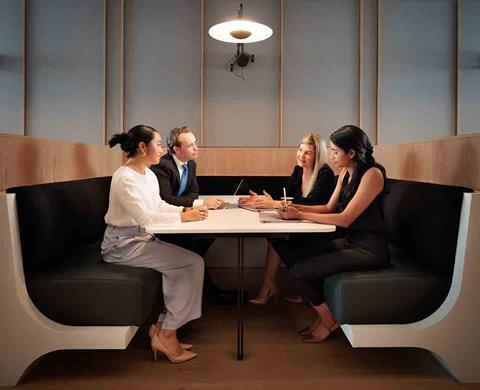
While the vast majority of its employees work in a hybrid way, law firm Herbert Smith Freehills ensures that all benefits are relevant to, and can be accessed by, everyone.
The organisation employs 5,000 members of staff across 23 offices globally, with 2,400 employed as lawyers. Its largest offices are in the UK and Australia.
The firm offers an agile working programme called Agile 60, where employees are asked to be in the office an average of 60% of the time. This aims to blend and balance both office- and home-working time, and recognises that office working has a key part to play in connection, collaboration and development. It is also flexible in that staff could be in the office 80% of the time one week or 40% another; they are trusted to choose what works best for them and their clients.
In terms of benefits for those working in the office, the firm has a variety of restaurants and dining options at many of its sites across the world, including subsidised lunches and free dinners for those working past 7pm at several locations. It hosts team lunches on anchor days that staff will be in the office at some sites, which have been well received, as well as dry cleaning, shoe shining and talks from experts.
The firm also has many on-site programmes to help employees make the most of their development and connections. Ellie Vaughan, head of reward at Herbert Smith Freehills, explains: “These include networking and information sessions, yoga and pilates classes, and access to firm-funded GP appointments, which are both on-site and virtual for hybrid employees. We also offer flu jabs and vouchers both on-site and at vaccination locations, so staff can book one for when they are in the office. Our biggest focus is ensuring our benefits strategies and engagement activities are suitable for a hybrid workforce. Historically, we had more support on-site or in central cities, but now we try to make sure that everything we do is flexible and has on-site and virtual choices.”
As its working practices have changed over the years following the Covid-19 pandemic, Herbert Smith Freehills has moved away from previously offering physical wellbeing benefits focused around subsidised and discounted gym memberships at gyms local to offices, to a wellbeing fund, where staff can claim back the costs of a variety of wellbeing activities, such as dance classes, weight management programmes and meditation apps.
Vaughan adds that this is by far the firm’s most popular benefit, because employees appreciate the level of flexibility and choice it offers, as well as the fact it does not tie them to an office.
“We’ve also thought about how they balance life and work commitments regarding child and dependent care,” she says. ”Through our agile approach, most employees don’t work the same days each week, so it can be tricky to plan care. We have an emergency care provision across multiple offices for last minute plan changes or if other care has fallen through. There is a certain number of days each year that the firm will pay for to cover this, and staff also have access to discounted rates through the care provider.”
The firm tries to encourage staff to embrace the agile-working approach and plan their work based on when they are in the office or at home, so when they are on-site they can take advantage of collaboration and building networks face to face. It has a sports and social committee, in-person and virtual town halls, and family, ability and religious networks to employees have opportunities to learn from, and spend time with, each other.
Over the past few years, its benefits strategies have shifted away from benefits being about specific items and discounts, to focus on working culture and energy in the workplace, the support and development the firm can offer, and the relationships staff have.
“We’ve looked at what we can do to build that culture and to ensure people enjoy the benefits of collaborating, and spending time together, and can make the most of their time in the office. There is a huge value in listening to staff about what they need and making their lives easier whether in the office or remotely. It’s important to ensure there are good on-site facilities and that the office environment is a nice space to work in for employees,” Vaughan concludes.










![Employment - Ethan Diver[2] copy](https://d1m12snq5oxhll.cloudfront.net/Pictures/100x67/8/6/0/106860_employmentethandiver2copy_200491.png)
